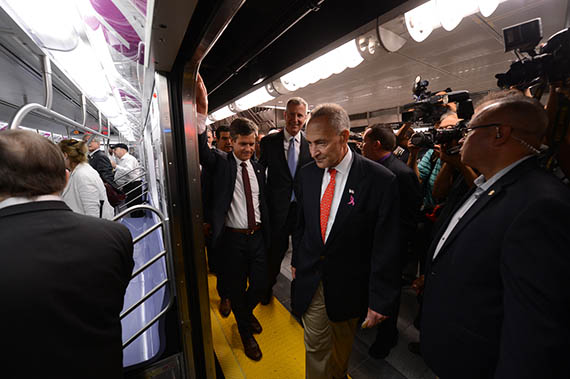With an expected $30 billion in revenue from the recently expanded No. 7 train, Sen. Charles Schumer wants to revive plans for a new station on the line.
“One of the best uses of that money would be to now start to build that station,” he said during a panel held by Crain’s on Monday morning. “This will create huge benefits, far more than the cost of building that extra station.”
Plans for the new station, originally set for West 41st Street and 10th Avenue, were dropped roughly a decade ago, since the city didn’t have the required “$600 million or so” to complete the job, said Dan Doctoroff, CEO of Sidewalk Labs. Doctoroff, who also served as deputy mayor of economic development under former Mayor Michael Bloomberg, said axing plans for the subway station inspired the “biggest fight” he’s ever had with Schumer, but they were able to strike a compromise that involved working with the Related Companies to create the necessary easements to make way for an eventual second station.
“It will happen,” Doctoroff said. “It’s absolutely the right thing to do.”
The 7 Subway Extension is part of the city’s IRT (Interborough Rapid Transit Company) Flushing line and one of many initiatives in the Hudson Yards redevelopment project. The first station in the extension, located at West 34th Street and 11th Avenue, opened in September.
The train, which has recently been dogged by a slew of disruptions, also came up in a later panel. Chris Ward, senior vice president of AECOM and former Port Authority executive director, was asked whether talks of bringing the train into Secaucus, New Jersey, would also be revived. Without hesitating, he said no.
“[MTA chairman] Tom [Prendergast] has an enormous system, he is under tremendous tremendous financial constraints, and his ability to deliver what he knows he has to deliver is enough on his plate,” Ward said.”Let’s not now add another potential project to further burden the MTA.”

Sen. Charles Schumer at Hudson Yards (credit: MTA)
For much of the first discussion, the panelists praised each other and the Bloomberg administration at large for their work on redeveloping Hudson Yards. Doctoroff called Schumer the “intellectual father of so much that happened on the westside” and said Related was the “only real estate developer in the world” that would be able to pull off the massive Hudson Yards redevelopment. When asked about criticism often lobbed at the Bloomberg administration — that it encouraged development without including enough affordable housing — Doctoroff said that the then-mayor rightly invested in the city at a time of crisis, in the wake of Sept. 11.
“We’re not smart enough to ultimately, at the end of the day, determine the forces of supply and demand,” he said. “With all due respect to the de Blasio administration, we actually, when nobody was talking about it, put in place an affordable housing program that built or preserved 165,000 units. Maybe that wasn’t enough because things improved faster than we hoped.”
At the panel, Related chair Stephen Ross also announced that the $200 million statue planned for the public plaza at Hudson Yards will be unveiled in September. He reiterated descriptions of the statue, which is designed by Thomas Heatherwick, as the Eiffel Tower of New York. Beyond that, the statue’s appearance remains a mystery.
Conversation also turned to the Gateway Tunnel, the new planned Hudson River tunnel and the latest iteration of the abandoned Access to the Region’s Core (ARC) tunnel project. When asked by Richard Anderson, president of the New York Building Congress, how the project will move forward without politicians getting cold feet, Schumer said that anyone who stands in the way of the project “will suffer politically for it.” He pointed to New Jersey Gov. Chris Christie, who canceled ARC in 2010.
“He regrets that decision now because he got walloped on it,” Schumer said, referring to Christie. “New Jersey now has much more of an interest in this. Politically, the person whose butt is most on the line is Christie.”
A spokesman for Christie, Brian Murray, said Schumer was attempting a “very strange attempt at historical revisionism.” He said “the governor stands firm that ARC was a poorly designed idea,” in which New Jersey was expected to cover 70 percent of the costs. In November, federal officials committed to footing at least half of the project’s cost.
